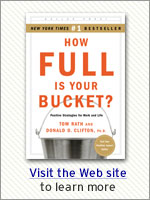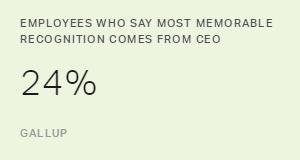The concepts of "recognition" and "praise" . . . are two critical components for creating positive emotions in organizations. In fact, [The Gallup Organization] has surveyed more than 4 million employees worldwide on this topic. Our latest analysis, which includes more than 10,000 business units and more than 30 industries, has found that individuals who receive regular recognition and praise:
- increase their individual productivity
- increase engagement among their colleagues
- are more likely to stay with their organization
- receive higher loyalty and satisfaction scores from customers
- have better safety records and fewer accidents on the job . . .
Killing productivity
Of course, there's a flip side. Right now, the majority of us don't give or receive anywhere near the amount of praise that we should. As a result, we're much less productive, and in many cases, completely disengaged in our jobs. According to the U.S. Department of Labor, the number-one reason people leave their jobs is because they "do not feel appreciated."
But the problem doesn't stop there.
 |
One study of healthcare workers found that when employees were working for a boss they disliked, they had significantly higher blood pressure. According to British scientist George Fieldman, this boss-induced hypertension could increase the risk of coronary heart disease by one-sixth and the risk of stroke by one-third.
"There was both a statistically and clinically significant elevation during the time people had the boss they didn't like," says Fieldman, a psychologist and psychotherapist. "People who work with bosses they've really hated constantly for years would probably be quite vulnerable to heart disease because of the elevation of blood pressure in the long-term."
Where productivity is concerned, it would be better for organizations if people who are overly negative stayed home. When they do show up for work, they are counterproductive. We all know these types of people. They walk around the office with glazed looks or move from cubicle to cubicle stirring up trouble with whining, complaining, and even paranoia.
Our estimates suggest that there are more than 22 million workers -- in the United States alone -- who are extremely negative or "actively disengaged." This rampant negativity is not only disheartening, it's expensive: It costs the U.S. economy between $250 and $300 billion every year in lost productivity alone. When you add workplace injury, illness, turnover, absences, and fraud, the cost could surpass $1 trillion per year, or nearly 10% of the U.S. Gross Domestic Product (GDP). These costs are not specific to the United States; they exist to varying degrees in every country, industry, and organization we have studied.
And our figures are conservative. To estimate costs accurately, we only accounted for the direct impact that "actively disengaged" employees have at work. We quantified the productivity -- or lack thereof -- occurring in each person's own workspace. In analyzing the data, we had to assume that each disengaged employee simply sat in his or her cubicle and didn't wreak havoc elsewhere -- an unlikely assumption, of course. Most disengaged employees do plenty of things each day that bring others down with their own sinking ship.
